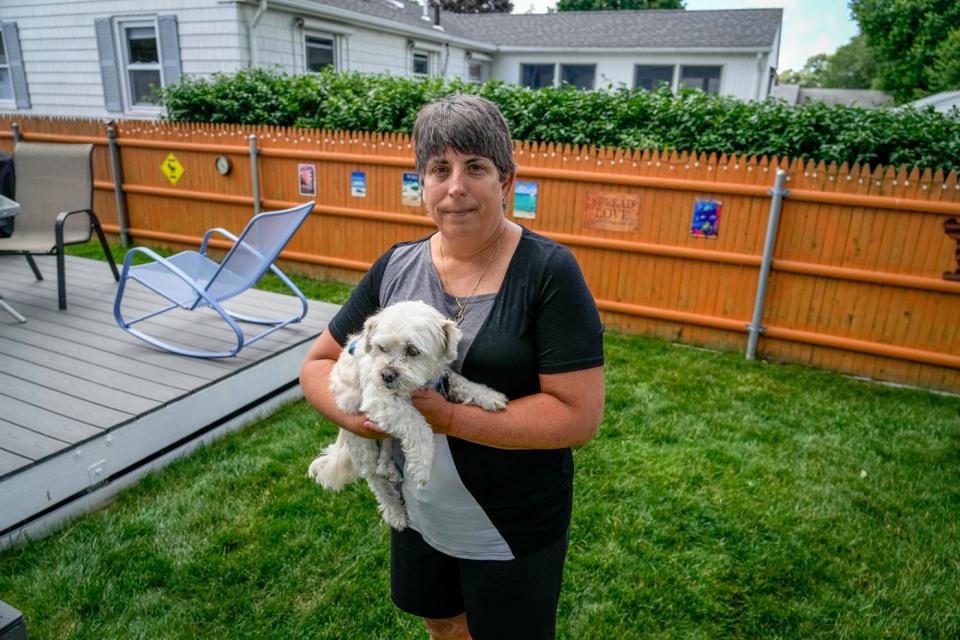What causes long COVID? Brown University researchers seeks answers for those who suffer
NORTH PROVIDENCE — When Linda Loxley contracted coronavirus disease in March 2021, her paramount concern was her husband, James, who had also become infected. Years before, he'd received a new kidney in a transplant, so presumably he would be more vulnerable to COVID-19 than she.
But James recovered and returned to health.
Linda, 56, did not.
"I ended up getting severely sick for three or four weeks," she said in a recent interview. She felt intense head pain — far worse than the migraines she had experienced in her 30s. Her joints ached. She had to leave the job she loved as a case manager at the Catholic Diocese of Providence's St. Martin de Porres Center, which serves older people in need.
"My primary-care physician had no idea what to do for me," Loxley said. She visited neurologists and hospital clinics and was prescribed "medications that made my symptoms even worse," she said. Acupuncture brought no improvement.
'Everything hurts': Rising number of long COVID sufferers are desperate for answers

Eventually, Loxley, who remains too sick to work, was diagnosed with long COVID, a condition that could afflict as many as 23 million Americans, according to a March report from the U.S. Government Accountability Office. Adding to the physical symptoms sufferers experience is the fact that long COVID — medically known as "post-acute sequelae of COVID-19, or PASC" — remains in many ways a medical mystery despite ongoing research, with no set treatment or certain prognosis.
"I've had a special two-day, 48-hour EEG, CAT scans, MRIs, all kinds of blood work and blood tests," Loxley said. "Everything comes back normal, and this is very common with long haul. There's something wrong inside, and they can't figure out how to treat us."
More: COVID subvariants BA.4 and BA.5 on the rise in Rhode Island. What you need to know
COVID vaccines and young children: Here's what Rhode Islanders need to know

Enter Brown School of Public Health
But efforts to do just that are underway — and the Long COVID Initiative at the Brown University School of Public Health, funded in part by the Hassenfeld Families Initiatives, is in the forefront of research, data collection and policy guidance regarding "the significant impact of Long COVID on people, communities, workplaces, healthcare, and society as a whole," according to the initiative's website.
"It takes time to do high-quality research, but unfortunately, that's leaving millions of Americans in limbo, trying to figure out what they should do if they think they have long COVID," the School of Public Health's Dr. Francesca Beaudoin, who leads the initiative, said in an interview. "It's also left clinicians and policymakers ill-equipped to make decisions around long COVID. So part of what we're doing is trying to fill in some of those gaps, particularly around social impacts of long COVID, mental health, and health disparities."
More: COVID-19 memorial with thousands of flags opens on RI State House lawn to honor lives lost

One gap is incidence. National estimates are just that — estimates — with state-level numbers even less precise. State Health Department spokesman Joseph Wendelken told The Journal in an email:
"Unfortunately, we do not have comprehensive data for the state on long COVID. Part of the challenge is that doctors and health officials are still coming to consensus on what constitutes long COVID and how to formally diagnose it. There is much more nuance involved than just determining whether someone does or does not have laboratory-confirmed acute COVID-19. At the national level, CDC and NIH are dedicating significant resources to this issue right now. This is one of the most rapidly evolving areas within the larger study of COVID-19."

Treatment remains elusive
As Loxley and millions of other American have discovered, the absence of firm clinical guidance can be anguishing.
"With a lot of diseases and things in medicine, there are clear algorithms to follow," Beaudoin said. "Somebody comes in with a heart attack and you know that you should do A, B and C, right away. There's no such approach with long COVID, and part of that is individuals vary greatly from one to the other. And so what may be the best course of treatment for one person might not be for another."
More: What you need to know about a second COVID booster shot for people over 50
Further consternation derives from the multitude of possible afflictions.
"We've created this big umbrella term for a variety of symptom clusters," Beaudoin said. "Some people have predominantly respiratory symptoms. Some people have predominantly neuropsychiatric symptoms: memory, mental health symptoms. Others have neurologic: pain, numbness, tingling. And the treatment of those probably varies, depending on what's going on. So we're just still scratching the surface with our understanding of Long COVID."
Faith moved her to advocacy
Loxley is participating in Brown's initiative with the hope that it will improve her health and the health of others who suffer. She belongs to the COVID-19 Long Haulers Support group on Facebook, which has nearly 90,000 members.
And she has assumed another role: advocate for the up to 23 million Americans living with long COVID.
Her Catholic faith moved her to go public, she told The Journal.
"I've been praying on it, and the reason I'm going through this is because I want to be a voice for us, our community, the 23 million people affected by long COVID issues," she said.
This article originally appeared on The Providence Journal: Long COVID numbers rise as Brown University initiative seeks answers
